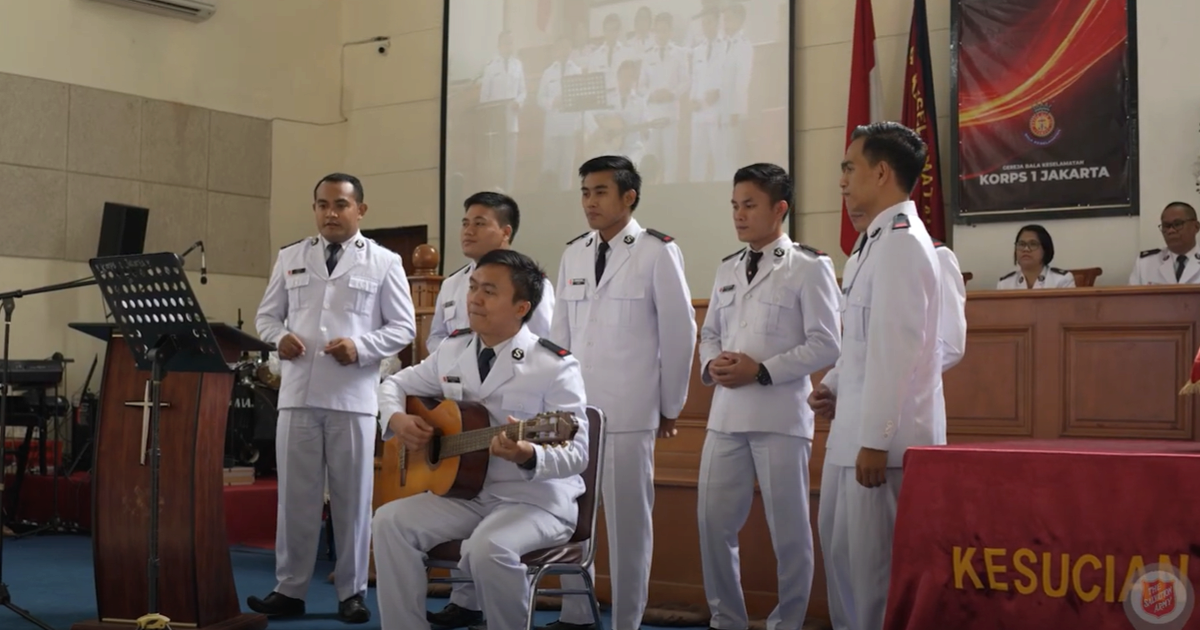Critics call it sheer insanity. Others say it is a practical doctrine. They are referring to Christianity's core conviction that God is best understood as Trinity: Father, Son and Holy Spirit. The Salvation Army affirms: We believe there are three persons in the Godhead—the Father, the Son and the Holy Ghost, undivided in essence and co-equal in power and glory. Let's attend to this doctrine's formation and its significance for our times.
The word Trinity is not in the Bible, but that doesn't make it unbiblical. The word was coined by the North African theologian, Tertullian, in the fourth century. And it came about through good reflection on the biblical texts.
This doctrine upholds the fundamental oneness of God. The conviction that “the Lord is one” is reaffirmed by Jesus when questioned by his critics (see Mark 12:28-29). The Army's second doctrine is not contradicted by its third doctrine. A trinitarian understanding of God continues to affirm God's oneness. The Lord is one.
The nature of God's oneness required further thought as the early church reflected on the person of Jesus of Nazareth. Questions about his identity arose even during his lifetime: “Who then is this, that even the wind and the sea obey him?” (Mark 4:41 NRSV). John's Gospel comes to its climax with the confession of Thomas: “My Lord and my God!” (John 20:28).
Similarly, as the Book of Acts portrays the Holy Spirit animating the early church in its mission from the Day of Pentecost to the Apostle Paul's imprisonment in Rome, the conviction developed that the Spirit's work was also the active presence of God.
Without loosening its grip on the oneness of God, the church began to understand God as Trinity. Even before the creation of the universe, there existed a dance of love between Father, Son and Holy Spirit. This triune love was expressed in our world, especially at Bethlehem, Galilee and Calvary. Then it motivated the church in its mission to that world.
It's important, however, to pay attention to the critics of this core conviction. Christians are not asked to park our minds outside when we enter the arena of faith. A helpful analogy to understand this doctrine is the notion of polyphonic music—poly meaning many and phonic meaning sound. In this form of music, different melodies are sung or played simultaneously. The differences are very real and distinguishable, yet they weave together to create a unified sound. God's unity embraces diversity. But this is not a puzzle to be solved; it's a mystery that leads to worship.
Far from being an abstract doctrine, this view of God has important practical implications for Christian living. It means, for instance, that The Salvation Army's unity will also embrace wide diversities. Unity does not mean uniformity. As noted last month in our study of our second doctrine, the Army's unity will be expressed in its character of integrity. But its oneness will embrace cultural diversity. This dimension of diversity was demonstrated in the recent territorial congress in Toronto when First Nations representatives welcomed General André Cox with thoughtful gifts, when Bermudian Patreese Simmons danced with grace and when Commissioner Silvia Cox addressed the crowd in French. Salvationists already understand diversity. But in our times, the need for diversity is even greater. This is particularly important in Canada where people from all parts of the world have come to live. A trinitarian understanding of God can help this nation be respectful of diversity.
In practice, a trinitarian view of God will also shape our sense of mission. David Bosch argues: “To participate in mission is to participate in the movement of God's love toward people, since God is a fountain of sending love.” God's eternal love between Father, Son and Holy Spirit spilled over into the world's history. He took the risk of entering into the suffering of humanity. It is this understanding of God that leads the Army into its mission of engaging the suffering of our world, whether it's our response to 9/11, caring for those with dementia or responding at Lac-Mégantic's rail disaster in Quebec. God's triune love prompts our mission of love.
“The grace of the Lord Jesus Christ, the love of God, and the communion of the Holy Spirit be with all of you” (2 Corinthians 13:13 NRSV).
Major Ray Harris is a retired Salvation Army officer of the Canada and Bermuda Territory. He lives in Winnipeg where he more often than not loses Scrabble games to his wife, Cathie.
Convictions Matter, Major Ray Harris' new book, is available at store.salvationarmy.ca, 416-422-6100, orderdesk@can.salvationarmy.org. For the e-book, visit amazon.ca
The word Trinity is not in the Bible, but that doesn't make it unbiblical. The word was coined by the North African theologian, Tertullian, in the fourth century. And it came about through good reflection on the biblical texts.
This doctrine upholds the fundamental oneness of God. The conviction that “the Lord is one” is reaffirmed by Jesus when questioned by his critics (see Mark 12:28-29). The Army's second doctrine is not contradicted by its third doctrine. A trinitarian understanding of God continues to affirm God's oneness. The Lord is one.
The nature of God's oneness required further thought as the early church reflected on the person of Jesus of Nazareth. Questions about his identity arose even during his lifetime: “Who then is this, that even the wind and the sea obey him?” (Mark 4:41 NRSV). John's Gospel comes to its climax with the confession of Thomas: “My Lord and my God!” (John 20:28).
Similarly, as the Book of Acts portrays the Holy Spirit animating the early church in its mission from the Day of Pentecost to the Apostle Paul's imprisonment in Rome, the conviction developed that the Spirit's work was also the active presence of God.
Without loosening its grip on the oneness of God, the church began to understand God as Trinity. Even before the creation of the universe, there existed a dance of love between Father, Son and Holy Spirit. This triune love was expressed in our world, especially at Bethlehem, Galilee and Calvary. Then it motivated the church in its mission to that world.
It's important, however, to pay attention to the critics of this core conviction. Christians are not asked to park our minds outside when we enter the arena of faith. A helpful analogy to understand this doctrine is the notion of polyphonic music—poly meaning many and phonic meaning sound. In this form of music, different melodies are sung or played simultaneously. The differences are very real and distinguishable, yet they weave together to create a unified sound. God's unity embraces diversity. But this is not a puzzle to be solved; it's a mystery that leads to worship.
Far from being an abstract doctrine, this view of God has important practical implications for Christian living. It means, for instance, that The Salvation Army's unity will also embrace wide diversities. Unity does not mean uniformity. As noted last month in our study of our second doctrine, the Army's unity will be expressed in its character of integrity. But its oneness will embrace cultural diversity. This dimension of diversity was demonstrated in the recent territorial congress in Toronto when First Nations representatives welcomed General André Cox with thoughtful gifts, when Bermudian Patreese Simmons danced with grace and when Commissioner Silvia Cox addressed the crowd in French. Salvationists already understand diversity. But in our times, the need for diversity is even greater. This is particularly important in Canada where people from all parts of the world have come to live. A trinitarian understanding of God can help this nation be respectful of diversity.
In practice, a trinitarian view of God will also shape our sense of mission. David Bosch argues: “To participate in mission is to participate in the movement of God's love toward people, since God is a fountain of sending love.” God's eternal love between Father, Son and Holy Spirit spilled over into the world's history. He took the risk of entering into the suffering of humanity. It is this understanding of God that leads the Army into its mission of engaging the suffering of our world, whether it's our response to 9/11, caring for those with dementia or responding at Lac-Mégantic's rail disaster in Quebec. God's triune love prompts our mission of love.
“The grace of the Lord Jesus Christ, the love of God, and the communion of the Holy Spirit be with all of you” (2 Corinthians 13:13 NRSV).
Major Ray Harris is a retired Salvation Army officer of the Canada and Bermuda Territory. He lives in Winnipeg where he more often than not loses Scrabble games to his wife, Cathie.
Convictions Matter, Major Ray Harris' new book, is available at store.salvationarmy.ca, 416-422-6100, orderdesk@can.salvationarmy.org. For the e-book, visit amazon.ca










Leave a Comment